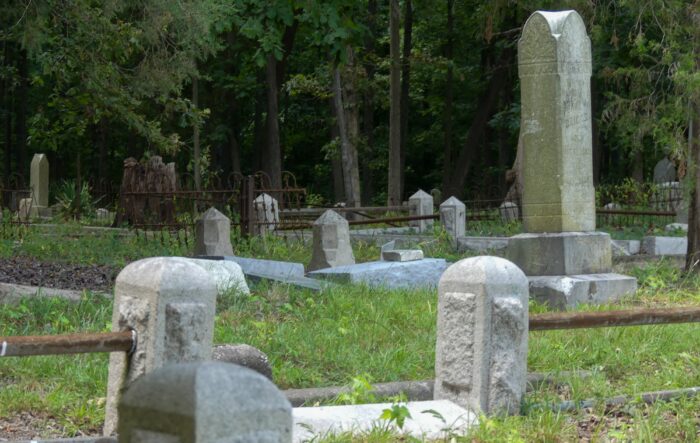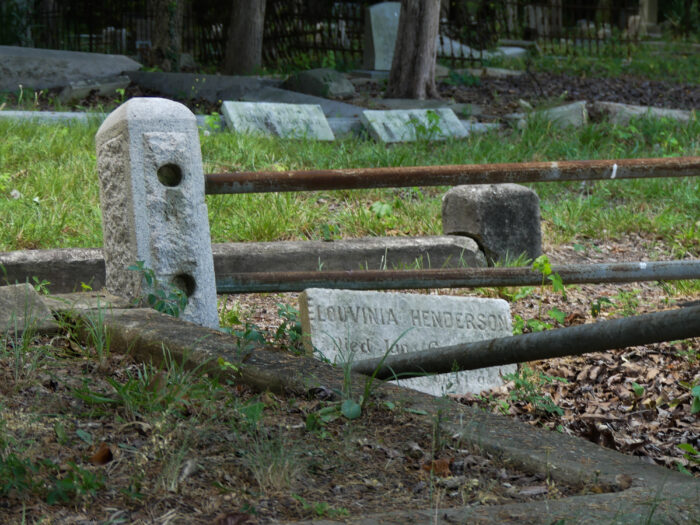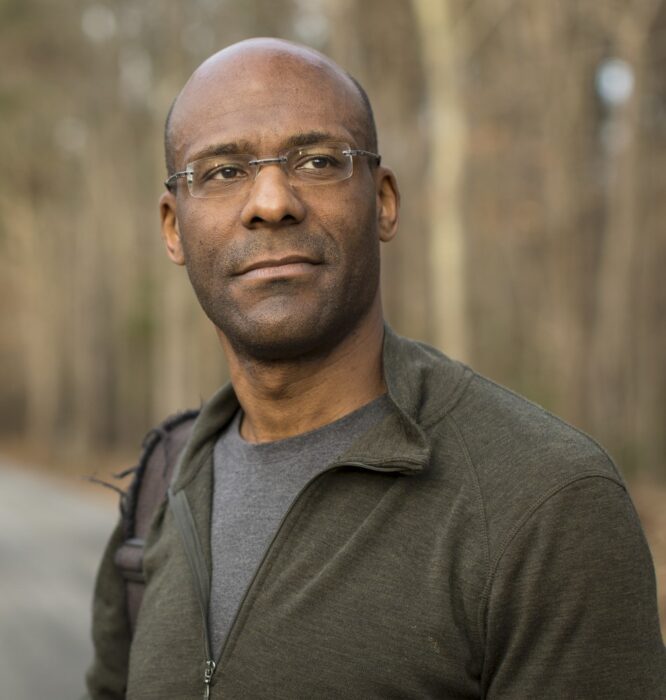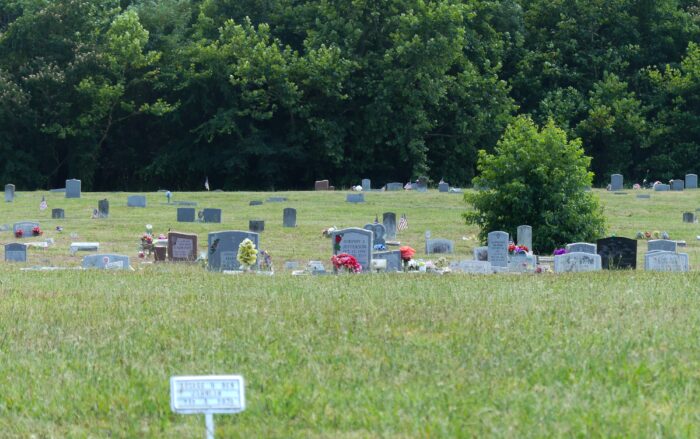
Evergreen Cemetery is one of three burial grounds that had been owned by Enrichmond Foundation. (Photos by Ianne Salvosa)
The entirety of three historic African American cemeteries are now in the hands of the City of Richmond, ending a struggle between public and private players over ownership of the burial grounds in the wake of the collapse of the Enrichmond Foundation.
Last month, the city acquired a small parcel of the East End Cemetery that sits just over the Henrico County line. It was the last remaining piece of the cemetery that the city didn’t own.
With that transfer complete, the city now fully controls the three cemeteries that had been owned by Enrichmond or entities tied to it, and were left in limbo since the nonprofit’s controversial dissolution two years ago: East End Cemetery at 1751 Evergreen Road, Evergreen Cemetery at 3600 E. Richmond Road and Forest View Cemetery at 4909 Bassett Ave.
The city’s Department of Parks, Recreation and Community Facilities will now work with community members on the upkeep of the grounds.
Department spokesperson Tamara Jenkins said $715,000 is allocated in the fiscal year 2025 budget for preservation of the cemeteries, along with $70,000 in grant funding.
“PRCF plans to work in partnership with the descendants, friends groups, and other community advocates to protect and persevere and restore these sacred burial grounds,” Jenkins said in an email.
Since 2023, the department has held five public community engagement sessions with nonprofit organizations and volunteers who had been involved with the maintenance of the grounds, Jenkins said. The groups had made clear that they wanted the city to take permanent ownership of the cemeteries.
Jenkins said the city was not initially aware of the recently acquired 0.6-acre parcel in Henrico when it began its cemetery land acquisitions in February. It was transferred for zero dollars. The parcel was once envisioned as a site for a visitors center for the burial grounds.
“The acquisition was needed to ensure that we owned the entire cemetery site,” Jenkins said in an email.
Falling into disarray
Years ago, the cemeteries had become overgrown with weeds and wisteria roots after long periods of neglect before volunteer organizations formed to clean up the sites. The three burial grounds are roughly 76 acres combined.
Enrichmond, which served as an umbrella organization for numerous nonprofits, took ownership of Evergreen Cemetery in 2017 from an entity tied to the Entzminger family for $140,000. It acquired the East End Cemetery in 2019 from the East End Burial Association for $35,000 and the Forest View in 2020 from the Forest View Land Co. for $6,523.
The restoration of the Evergreen and East End cemeteries was one of Enrichmond’s largest expenses in 2020. Approximatley $654,000 was spent to procure a conservation easement and on maintenance for the grounds, according to the organization’s public tax records. An additional $652,000 was spent on Evergreen Cemetery from 2017 to 2019.
Despite those expenses, descendants of those buried at the cemeteries and volunteers had long criticized Enrichmond for its mistreatment of the cemeteries. Exposed remains discovered at East End Cemetery in 2020 deepened distrust from descendants and volunteers.
The burial grounds are the final resting place of many historic African American figures, including bank owner Maggie Walker and newspaper editor John Mitchell Jr.
Enrichmond ultimately dissolved in 2022, leaving the organizations they supported and the cemeteries in operational and financial uncertainty.
For decades, the foundation controlled up to half a million dollars in finances for many nonprofits, and its sudden shutdown left groups without access to the funds. Last year, the Richmond Outdoor and Prosperity Fund launched a $250,000 grant initiative for nonprofits that Enrichmond left by the wayside, while some groups raised funds on their own to get themselves back afloat.
A rocky relationship
Brian Palmer — a founding member of Friends of East End, an organization dedicated to preserving the East End Cemetery — said the group is working with city officials to carve out the nature of their relationship with regard to ongoing maintenance of the cemetery. Volunteer advisory committees have been formed to handle topics including fundraising, maintenance and cultural landscape.
Palmer’s group was established in 2013 to clear plant overgrowth in the cemetery and remove illegal dumping. He said the Friends developed an adversarial relationship with Enrichmond after the organization asked volunteers to sign a series of restrictive agreements that requested access and rights to all intellectual property the Friends produced related to the cemeteries.
“The Friends of East End started the work and never abandoned it,” Palmer said.
Palmer said that Enrichmond excluded volunteers during its ownership of the cemeteries and that volunteers were misled as to the extent of the relationship between Enrichmond and the Virginia Outdoors Foundation.
The Virginia Outdoors Foundation is a state agency that holds the conservation easement for the Evergreen and East End cemeteries. It granted $400,000 to Enrichmond in 2016 for the restoration of those cemeteries. The agency is responsible for working with the owners of the cemeteries to make sure they’re maintaining access to the grounds and ensuring no encroachment on the property.
Former Enrichmond executive director John Sydnor and other former Enrichmond officials could not be reached for comment.
Palmer said he is optimistic for the city’s ownership of the cemeteries because city officials understand that the properties are historic sites and not just burial grounds.
“We have seen that they listen and they respect what we have to say because we’ve been out there so long doing this work,” he said.
Moving forward
Nathan Burrell, a spokesman for Virginia Outdoors Foundation, said city ownership of the cemeteries will open up the opportunity for more community involvement with the historic sites.
He said that while nonprofits like Enrichmond had many commitments and difficulties in managing a property, the organization created momentum for educating the public on the significance of the burial grounds.
“Government is the place where we’re able to actually hold space and create opportunity for the community to engage,” Burrell said.
He said the Friends of East End and other volunteers have been working diligently to restore the cemeteries from a period of neglect during Enrichmond’s tenure. He said volunteers have removed most of the shrub cover, but grass has been creeping and covering some headstones.
“There’s a lot of work still to be done, but some headway was made. And I think that headway allowed for people to see not only the need of this, but the importance of this space,” Burrell said.

Evergreen Cemetery is one of three burial grounds that had been owned by Enrichmond Foundation. (Photos by Ianne Salvosa)
The entirety of three historic African American cemeteries are now in the hands of the City of Richmond, ending a struggle between public and private players over ownership of the burial grounds in the wake of the collapse of the Enrichmond Foundation.
Last month, the city acquired a small parcel of the East End Cemetery that sits just over the Henrico County line. It was the last remaining piece of the cemetery that the city didn’t own.
With that transfer complete, the city now fully controls the three cemeteries that had been owned by Enrichmond or entities tied to it, and were left in limbo since the nonprofit’s controversial dissolution two years ago: East End Cemetery at 1751 Evergreen Road, Evergreen Cemetery at 3600 E. Richmond Road and Forest View Cemetery at 4909 Bassett Ave.
The city’s Department of Parks, Recreation and Community Facilities will now work with community members on the upkeep of the grounds.
Department spokesperson Tamara Jenkins said $715,000 is allocated in the fiscal year 2025 budget for preservation of the cemeteries, along with $70,000 in grant funding.
“PRCF plans to work in partnership with the descendants, friends groups, and other community advocates to protect and persevere and restore these sacred burial grounds,” Jenkins said in an email.
Since 2023, the department has held five public community engagement sessions with nonprofit organizations and volunteers who had been involved with the maintenance of the grounds, Jenkins said. The groups had made clear that they wanted the city to take permanent ownership of the cemeteries.
Jenkins said the city was not initially aware of the recently acquired 0.6-acre parcel in Henrico when it began its cemetery land acquisitions in February. It was transferred for zero dollars. The parcel was once envisioned as a site for a visitors center for the burial grounds.
“The acquisition was needed to ensure that we owned the entire cemetery site,” Jenkins said in an email.
Falling into disarray
Years ago, the cemeteries had become overgrown with weeds and wisteria roots after long periods of neglect before volunteer organizations formed to clean up the sites. The three burial grounds are roughly 76 acres combined.
Enrichmond, which served as an umbrella organization for numerous nonprofits, took ownership of Evergreen Cemetery in 2017 from an entity tied to the Entzminger family for $140,000. It acquired the East End Cemetery in 2019 from the East End Burial Association for $35,000 and the Forest View in 2020 from the Forest View Land Co. for $6,523.
The restoration of the Evergreen and East End cemeteries was one of Enrichmond’s largest expenses in 2020. Approximatley $654,000 was spent to procure a conservation easement and on maintenance for the grounds, according to the organization’s public tax records. An additional $652,000 was spent on Evergreen Cemetery from 2017 to 2019.
Despite those expenses, descendants of those buried at the cemeteries and volunteers had long criticized Enrichmond for its mistreatment of the cemeteries. Exposed remains discovered at East End Cemetery in 2020 deepened distrust from descendants and volunteers.
The burial grounds are the final resting place of many historic African American figures, including bank owner Maggie Walker and newspaper editor John Mitchell Jr.
Enrichmond ultimately dissolved in 2022, leaving the organizations they supported and the cemeteries in operational and financial uncertainty.
For decades, the foundation controlled up to half a million dollars in finances for many nonprofits, and its sudden shutdown left groups without access to the funds. Last year, the Richmond Outdoor and Prosperity Fund launched a $250,000 grant initiative for nonprofits that Enrichmond left by the wayside, while some groups raised funds on their own to get themselves back afloat.
A rocky relationship
Brian Palmer — a founding member of Friends of East End, an organization dedicated to preserving the East End Cemetery — said the group is working with city officials to carve out the nature of their relationship with regard to ongoing maintenance of the cemetery. Volunteer advisory committees have been formed to handle topics including fundraising, maintenance and cultural landscape.
Palmer’s group was established in 2013 to clear plant overgrowth in the cemetery and remove illegal dumping. He said the Friends developed an adversarial relationship with Enrichmond after the organization asked volunteers to sign a series of restrictive agreements that requested access and rights to all intellectual property the Friends produced related to the cemeteries.
“The Friends of East End started the work and never abandoned it,” Palmer said.
Palmer said that Enrichmond excluded volunteers during its ownership of the cemeteries and that volunteers were misled as to the extent of the relationship between Enrichmond and the Virginia Outdoors Foundation.
The Virginia Outdoors Foundation is a state agency that holds the conservation easement for the Evergreen and East End cemeteries. It granted $400,000 to Enrichmond in 2016 for the restoration of those cemeteries. The agency is responsible for working with the owners of the cemeteries to make sure they’re maintaining access to the grounds and ensuring no encroachment on the property.
Former Enrichmond executive director John Sydnor and other former Enrichmond officials could not be reached for comment.
Palmer said he is optimistic for the city’s ownership of the cemeteries because city officials understand that the properties are historic sites and not just burial grounds.
“We have seen that they listen and they respect what we have to say because we’ve been out there so long doing this work,” he said.
Moving forward
Nathan Burrell, a spokesman for Virginia Outdoors Foundation, said city ownership of the cemeteries will open up the opportunity for more community involvement with the historic sites.
He said that while nonprofits like Enrichmond had many commitments and difficulties in managing a property, the organization created momentum for educating the public on the significance of the burial grounds.
“Government is the place where we’re able to actually hold space and create opportunity for the community to engage,” Burrell said.
He said the Friends of East End and other volunteers have been working diligently to restore the cemeteries from a period of neglect during Enrichmond’s tenure. He said volunteers have removed most of the shrub cover, but grass has been creeping and covering some headstones.
“There’s a lot of work still to be done, but some headway was made. And I think that headway allowed for people to see not only the need of this, but the importance of this space,” Burrell said.



Still would like to know Who were enriched by the Enrichmond foundation. Nothing but crickets from RTD and City officials.
I find it comical the article here that they say the ownerships by the city will enhance citizen participation. Yeah, sure! The city government and Richmond is known for citizen cooperation in participation and decision-making especially with facility money spending ha ha!
I mean they are not “bodies” coming out of the ground, but the city’s maintained public cemeteries have their own maintenance issues that have been around for years.